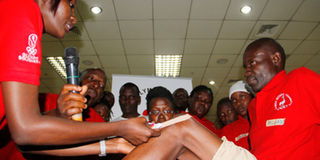UOC equips federations with injury treatment knowledge

UOC physiotherapist Miriam Mirembe (L)demonstrates to participants how to K-Tape a sports person. This was during the UOC organised medical workshop at Imperial Royale Hotel in Kampala on Friday. PHOTO BY ISMAIL KEZAALA
KAMPALA- Walking into one of the halls at Imperial Royale Hotel, the sight was of participants gathered around Uganda Olympic Committee (UOC) physiotherapist Miriam Mirembe.
At a closer glance, Mirembe, the Team Uganda physiotherapist at the 2014 Commonwealth Games, was busy showcasing a K-taping method of injury control. This is one of the ways of managing athletes’ niggles, muscle tears, among other muscle complications.
That session was only a glimpse of the several topics that sports doctors, physios, cardiologists and federation representatives, covered during the two-day UOC Sports Medicine workshop that climaxed on Friday.
The seminar witnessed presentations about basic life support, cardiac screening, common injuries and burnout in youth sports
“Before an athlete takes part in an event, we want them to have had all the necessary and basic medical support,” UOC president William Blick said at the end of the event.
About 60 participants from different institutions and backgrounds attended the seminar whose theme was ‘priotising the health of athlete’.
And many said they had benefited from the workshop. “I have learnt how to work on chest injuries,” James Ssenkungu, a coach from para-athletics opened up. Ssenkungu coached David Emong before he won Uganda’s only medal, a silver, at the Paralympics in Brazil recently.
Another, Martin Mugabi, had something else to take home for his Masindi Little League Sports Academy.
“I have learnt how to document medical forms for sportsmen ahead of international engagements,” Mugabi said. “The doping sessions taught me something new.”
Similarly, Kampala Hockey Club (KHC) defender Desire Mukisa picked some lessons about the anti-doping code. “We used to hear about doping in other countries like Russia and USA,” she noted.
“I also got skills on how to maintain confidentiality of medical documents for sportsmen and how to handle emergencies on the pitch such as concussions and cardiac arrests that are common in contact sports like hockey,” Mukisa, a practicing medic, added.




